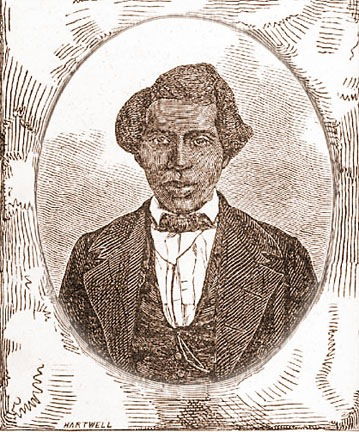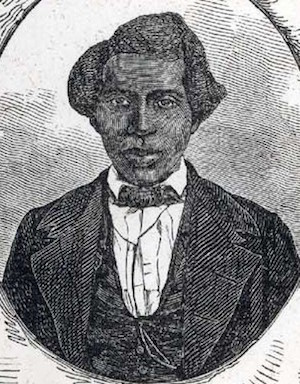ThrobbingHood
“I’m Sorry for 2025”

Tunis Campbell was the highest-ranking and most influential African American politician in nineteenth-century Georgia. Born on April 1, 1812, in Middlebrook, New Jersey, he was the eighth of ten children of free Black parents. From ages five to eighteen he attended an otherwise all-white Episcopal school in Babylon, New York, where he trained for missionary service with the American Colonization Society’s program of transporting African Americans to Liberia. Upon graduation—which coincided with the onset of the second Great Awakening and the rise of William Lloyd Garrison’s abolitionist newspaper, The Liberator—Campbell joined the Methodist Churchand threw himself into evangelical uplift. In 1832 he founded an anticolonization society and pledged “never to leave this country until every slave was free on American soil.”
While he preached against slavery and established schools, Campbell worked as a hotel steward in New York City and Boston. His Hotel Keepers, Head Waiters, and Housekeepers’ Guide (1848) provides practical information for supervising and running a first-class hotel, but the book is more valuable for its instruction in interracial social skills, its insistence that managers recognize the dignity of labor, and its emphasis on the need for workers to be educated, well paid, prompt, clean, and competitive. White employers described Campbell as a man disposed “to elevate the condition and character of persons of his color.”
Before the Civil War (1861-65) he actively participated in the Colored Convention Movement and often shared the stage with the writer and abolitionist Frederick Douglass. By 1861 Campbell was married, had three children, and was a copartner in a New York bakery. In 1863 U.S. secretary of war Edwin Stanton commissioned the fifty-one-year-old Campbell to work in Port Royal, South Carolina, where freedpeople were gathering under the protection of the U.S. military.
After Union general William T. Sherman captured Savannah in December 1864, on his march to the sea, and Congress set up the Freedmen’s Bureau in March 1865, Campbell was appointed to supervise land claims and resettlement on five Georgia islands: Ossabaw, Delaware, Colonels, St. Catherines, and Sapelo. Georgia planters, who received pardons from U.S. president Andrew Johnson, regained control of these islands in 1866. Campbell quickly purchased 1,250 acres at Belle Ville in McIntosh County and there established an association of Black landowners to divide parcels and profit from the land.
In 1867 Congress ordered a further Reconstructionof the South. As vice president of the Republican Party in Georgia, Campbell worked to register voters before being elected as a justice of the peace, a delegate to the state constitutional convention, and a state senator from the Second Senatorial District (Liberty, McIntosh, and Tattnall counties). In the legislature Campbell pushed for laws for equal education, integrated jury boxes, homestead exemptions, abolishment of imprisonment for debt, open access to public facilities, and fair voting procedures. As a justice of the peace, minister, and political boss, Campbell organized a Black power structure in McIntosh County that protected freed people from white abuses, whether against their bodies or in labor negotiations. He headed a 300-strong African American militia that guarded him from reprisals by the Ku Klux Klan or others, even though his home was burned, he was poisoned, and his family lived in constant fear.
After Democrats regained state power in 1871 by forcing Republican Governor Rufus Bullock to flee the state, they began a concerted effort to overturn Reconstruction. Campbell’s legislative seat was taken, and a series of lawsuits kept him in legal trouble. He traveled to Washington, D.C., where he met with U.S. president Ulysses S. Grant and Senator Charles Sumner to urge that the government intervene actively to save Reconstruction. Finally, in 1876, while the U.S. attorney general tried to free him, Campbell was tried and convicted of malfeasance in office, taken from a Savannah jail, handcuffed, chained, and leased out for one year to a convict labor camp. Upon release he went immediately to Washington to meet with U.S. president Rutherford B. Hayes and wrote a small book, Sufferings of the Reverend T. G. Campbell and His Family in Georgia (1877). He died in Boston on December 4, 1891.

Tunis Campbell - New Georgia Encyclopedia
Tunis Campbell was the highest-ranking and most influential African American politician in nineteenth-century Georgia. Born on April 1, 1812, in Middlebrook, New Jersey, he was the eighth of ten children of free Black parents. From ages five to eighteen he attended an otherwise all-white...

 I find some more info on him
I find some more info on him



 Born up North but went down South to help the fam get settled during some wild times. I respect it.
Born up North but went down South to help the fam get settled during some wild times. I respect it. "
" 